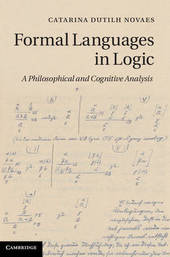
|
Formal Languages in Logic: A Philosophical and Cognitive Analysis
Hardback
Main Details
| Title |
Formal Languages in Logic: A Philosophical and Cognitive Analysis
|
| Authors and Contributors |
By (author) Catarina Dutilh Novaes
|
| Physical Properties |
| Format:Hardback | | Pages:282 | | Dimensions(mm): Height 236,Width 158 |
|
| Category/Genre | Philosophy - logic |
|---|
| ISBN/Barcode |
9781107020917
|
| Classifications | Dewey:160 |
|---|
| Audience | | Professional & Vocational | |
|---|
| Illustrations |
4 Tables, black and white; 1 Halftones, unspecified; 3 Line drawings, unspecified
|
|
Publishing Details |
| Publisher |
Cambridge University Press
|
| Imprint |
Cambridge University Press
|
| Publication Date |
8 November 2012 |
| Publication Country |
United Kingdom
|
Description
Formal languages are widely regarded as being above all mathematical objects and as producing a greater level of precision and technical complexity in logical investigations because of this. Yet defining formal languages exclusively in this way offers only a partial and limited explanation of the impact which their use (and the uses of formalisms more generally elsewhere) actually has. In this book, Catarina Dutilh Novaes adopts a much wider conception of formal languages so as to investigate more broadly what exactly is going on when theorists put these tools to use. She looks at the history and philosophy of formal languages and focuses on the cognitive impact of formal languages on human reasoning, drawing on their historical development, psychology, cognitive science and philosophy. Her wide-ranging study will be valuable for both students and researchers in philosophy, logic, psychology and cognitive and computer science.
Author Biography
Catarina Dutilh Novaes is Assistant Professor at the Faculty of Philosophy of the University of Groningen, The Netherlands. She is the author of Formalizing Medieval Logical Theories (2007).
Reviews'Since the rise of logical empiricism, formal languages have become essential tools of doing philosophy. But why does formalization work? And what are its limitations? This book fills a crucial gap in the literature by addressing these questions from a cognitive, historical, and logical point of view. I recommend it to formal philosophers, critics of formal philosophy, and everyone with an interest in the techniques of conceptual engineering per se.' Hannes Leitgeb, Ludwig Maximilians Universitat Munich
|